
Why Understanding Baby Needs is Essential for New Parents
When creating a shopping list for a new baby, baby needs can feel overwhelming - retailers may have you convinced that your baby's survival requires buying all the things. But the reality is simpler than you think.
Essential Baby Needs Categories:
-
Sleep: Safe crib, firm mattress, fitted sheets, swaddles
-
Feeding: Bottles/nursing supplies, burp cloths, bibs
-
Diapering: Diapers, wipes, changing pad, rash cream
-
Clothing: Onesies, sleepers, weather-appropriate outfits
-
Bathing: Baby tub, gentle soap, soft towels
-
Travel: Car seat, stroller, diaper bag
-
Health: Thermometer, nail clippers, first aid basics
The truth is, babies really only need some clothes, a place to sleep, and love. Everything else falls into "nice-to-have" territory. This guide cuts through the marketing noise to focus on what actually matters for your baby's comfort, safety, and development.
As someone who struggled with my own newborn's sleep challenges, I know how crucial it is to distinguish between marketing hype and genuine baby needs. I'm Gary Harutyunyan, and my experience as both a new father and inventor of sleep solutions has taught me that the most important baby needs are often the simplest ones that support rest and bonding.
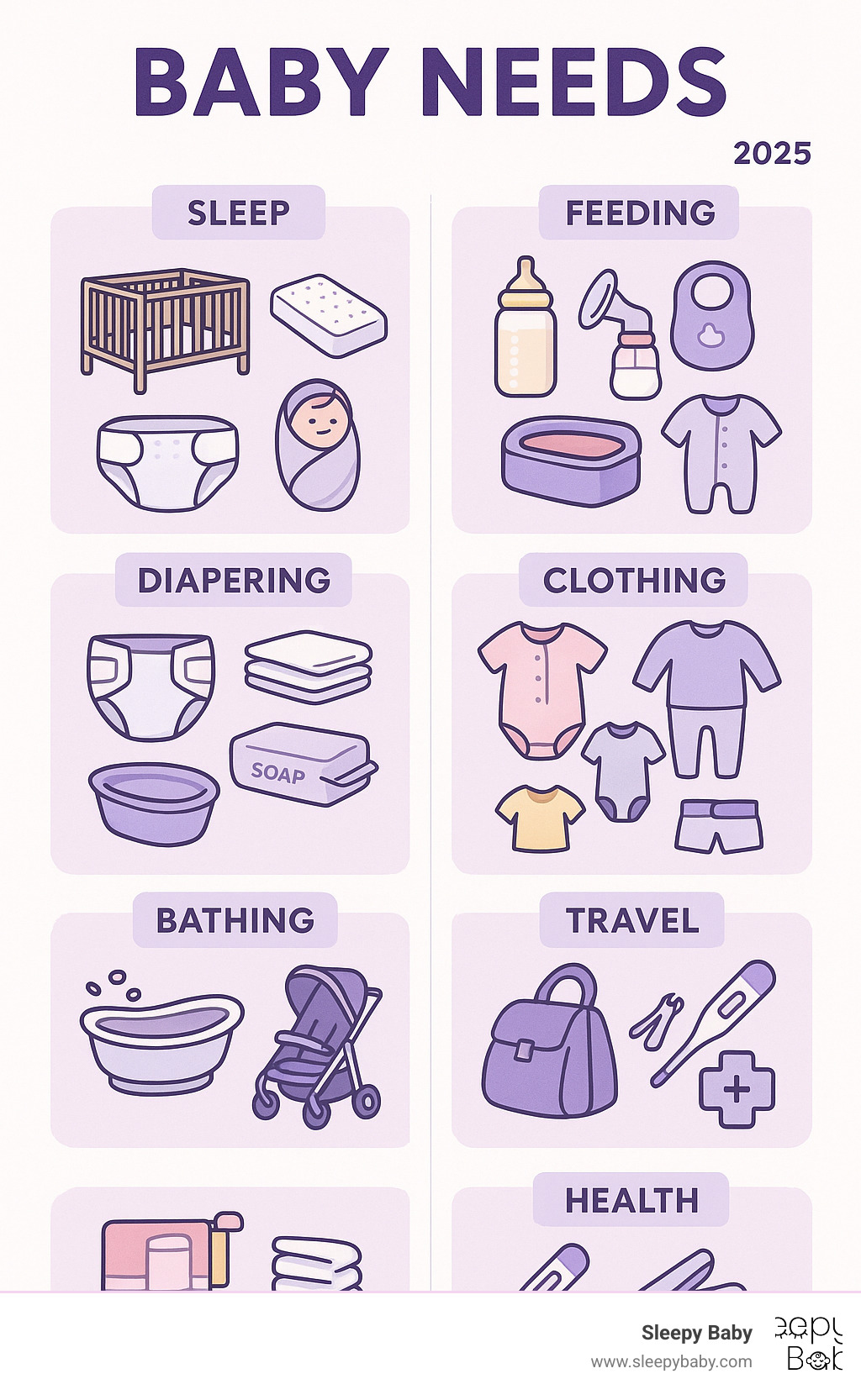
The Ultimate Newborn Essentials Checklist
Bringing a new baby home is an exciting trip, but it doesn't have to break the bank. We've distilled the long lists down to the true must-haves for your baby's first few months, from safe sleep to diapering and dressing.
A Safe Place to Sleep
When it comes to baby needs for sleep, safety is the top priority. A safe sleep environment helps protect against Sudden Infant Death Syndrome (SIDS). The American Academy of Pediatrics (AAP) recommends placing babies alone, on their back, in a safety-approved crib, bassinet, or play yard with a firm mattress and fitted sheet.
You'll need:
-
Crib or Bassinet: A bassinet is great for the first few months, but a crib is needed once your baby can roll over. Ensure any crib meets current safety standards.
-
Firm, Flat Mattress: The mattress must be firm and fit snugly with no gaps.
-
Waterproof Mattress Protector: Keeps the mattress clean and hygienic.
-
3-4 Fitted Sheets: Have extras on hand for quick changes. They must fit securely.
-
Swaddles or Sleep Sacks: 3-5 swaddles or sleep sacks help newborns feel secure. Transition to a sleep sack (a wearable blanket) once your baby shows signs of rolling. Never place loose blankets, pillows, or toys in the crib.
For more details, consult the AAP's safe sleep guidelines. For insights into sleep solutions, see our guide on From Cradle to Bassinet: Ensuring Sweet Dreams for Your Newborn.
Diapering Duty: Supplies for Every Change
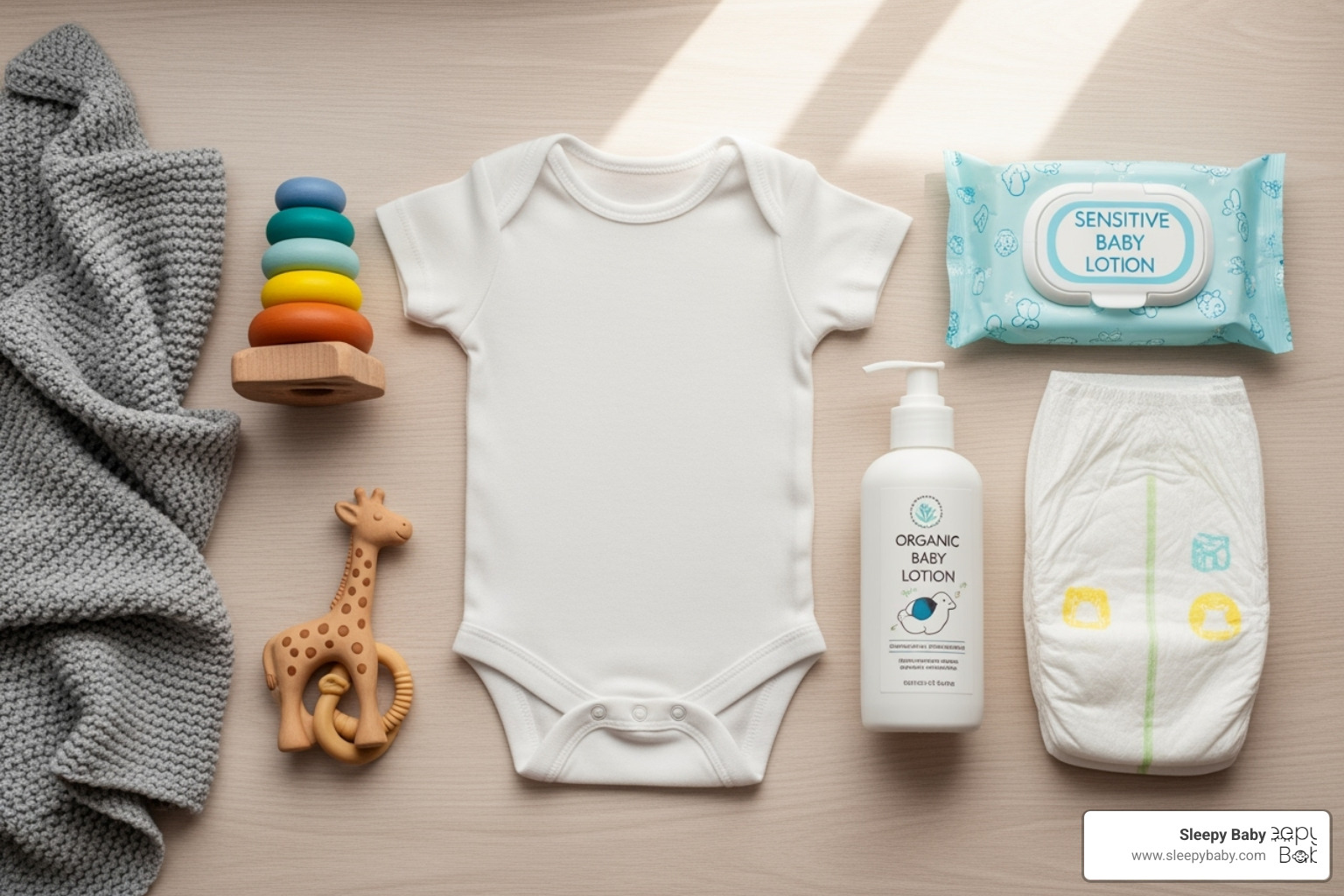
You'll quickly become a pro at diaper changes, and having the right baby needs ready makes it smoother. Newborns need 6-9 diaper changes a day.
Here's what you'll need:
-
Newborn Diapers: Start with a small pack, as babies grow quickly.
-
Unscented Baby Wipes: Choose unscented, alcohol-free wipes for sensitive skin.
-
Diaper Rash Cream: A barrier cream is essential to prevent and treat diaper rash.
-
Changing Pad: A portable pad provides a comfortable, hygienic surface.
-
Diaper Pail or Wet Bags: A diaper pail contains odors. Wet bags are great for cloth diapers.
The Newborn Wardrobe
When it comes to baby needs for clothing, focus on comfort and ease of changing, as babies grow incredibly fast.
Here's a practical checklist:
-
4-8 Onesies or Bodysuits: Look for envelope folds at the neck for easy changes.
-
5-7 One-Piece Sleepers: Footie pajamas are practical and comfortable.
-
4-8 Pairs of Pants: Simple, stretchy pants for layering.
-
4-6 Pairs of Socks/Booties: To keep feet warm.
-
1-3 Newborn Hats: Season-appropriate caps or sun hats.
-
1-3 Cardigans or Jackets: For layering.
-
Bibs: To keep outfits cleaner.
Remember the general rule: dress your baby in one more layer than you're wearing. The AAP has advice on dressing babies properly for the weather.
Gearing Up for Mealtime
Having the right baby needs for mealtime will make feeding much smoother, whether you breastfeed or use formula.
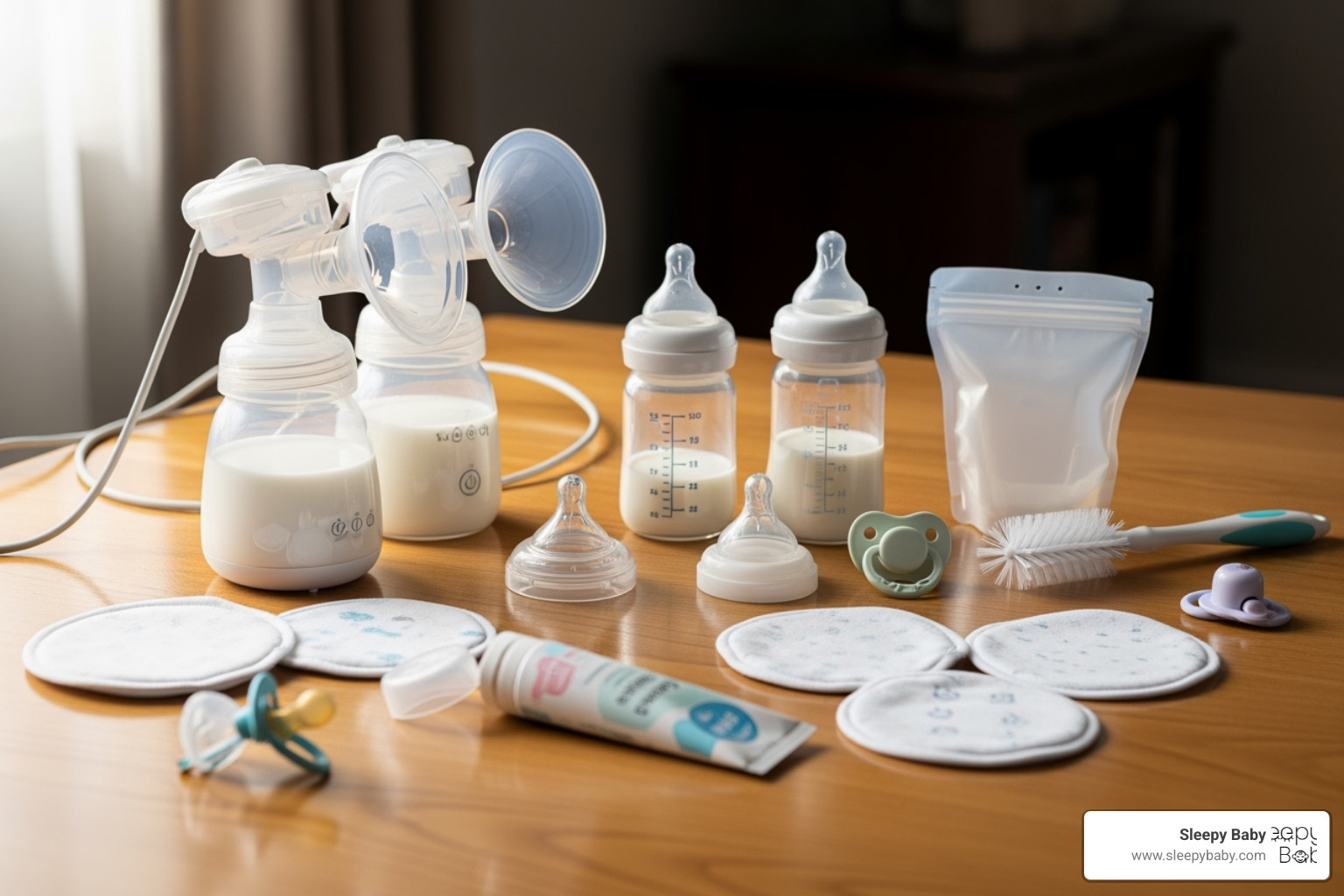
For Breastfeeding Parents:
-
Nursing Bras: Comfortable, supportive bras that allow for easy access.
-
Breast Pads: To manage milk leakage.
-
Breast Pump: A manual or electric pump helps express milk. Some parents also use a silicone milk collector to catch letdown from the opposite breast during feeding.
-
Nipple Cream: To soothe soreness from breastfeeding.
For Formula-Feeding Parents:
-
6-12 Bottles: Have both 4-ounce and 8-ounce bottles.
-
Nipples: Use newborn-flow nipples to start.
-
Formula: Choose an iron-fortified infant formula.
-
Bottle Brush: Essential for thorough cleaning.
-
Sterilizing Equipment: A steam sterilizer or boiling water can be used to sterilize bottles and pump parts daily.
For All Feeding Methods:
-
A Dozen Burp Cloths: Babies spit up frequently, so you'll need plenty.
-
Bibs: To protect clothes from drool and spit-up.
Feeding a newborn can be exhausting. For tips on managing nighttime feeds, read our guide: Should I Wake My Newborn to Feed or Let Sleeping Babies Lie?.
Bath Time & Health Basics
For baby needs related to health and hygiene, simple is best.
-
Infant Tub: Provides support for slippery newborns.
-
2-3 Hooded Towels: To keep your baby warm after a bath.
-
4-6 Soft Washcloths: For gentle cleaning.
-
Tear-Free Baby Soap/Shampoo: Use a mild, non-perfumed formula. Newborns only need bathing a couple of times a week.
-
Digital Rectal Thermometer: The most accurate way to take a newborn's temperature.
-
Nasal Aspirator: To clear stuffy noses.
-
Baby Nail Clippers or File: To prevent scratches.
The AAP recommends sponge baths until their umbilical cord stump falls off, usually within the first 1-3 weeks.
On the Go: Essential Travel Gear
Eventually, you'll want to leave the house! Getting out with a baby requires the right baby needs to ensure safety and convenience.
Choosing a Safe Car Seat and Stroller
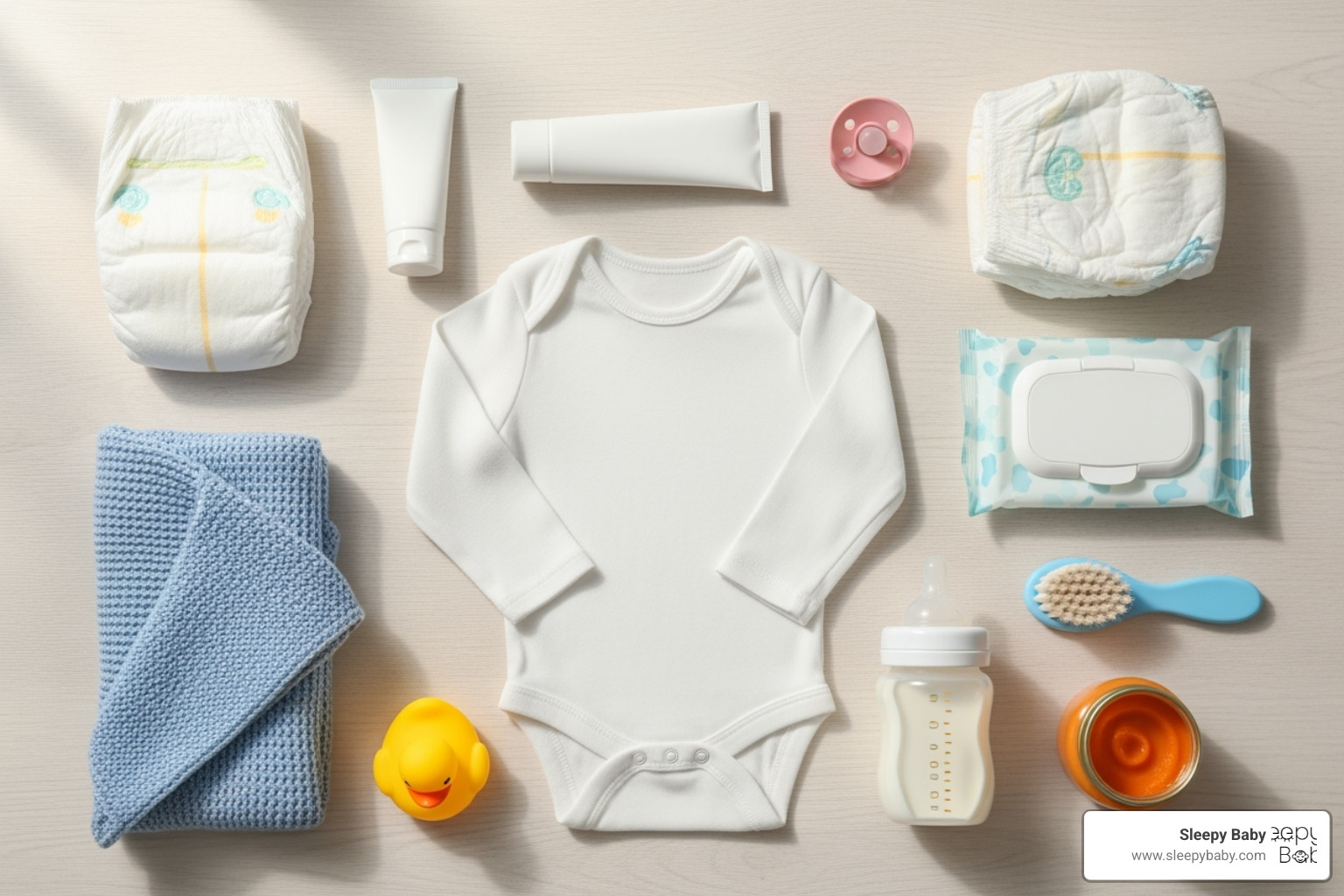
-
Infant or Convertible Car Seat: A car seat is a non-negotiable safety item required by hospitals. An infant car seat often includes a carrier that snaps into a base, while a convertible car seat grows with your child. Never use a secondhand car seat unless you know its full history.
-
Proper Installation: Proper installation is critical. Consult your manual and consider getting it checked by a certified technician. Refer to Car seat safety recommendations from NHTSA.
-
Stroller: A "travel system" combines an infant car seat and stroller, which is convenient for newborns. Other options include lightweight or full-size strollers.
-
Diaper Bag: A large bag to hold all your on-the-go essentials.
The Benefits of Babywearing
Baby carriers and slings are fantastic baby needs for keeping your newborn close while your hands are free.
-
Types of Carriers: Options include wraps, slings, and structured carriers. Choose what feels most comfortable and secure for you and your baby.
-
Benefits: Babywearing promotes bonding, can soothe a fussy baby, and helps steer crowded places.
-
Safety Checks: Always follow the manufacturer's instructions and ensure your baby is in a safe position (e.g., the TICKS rule for slings: Tight, In view at all times, Close enough to kiss, Keep chin off chest, Supported back).
For more travel tips, check out The Definitive Guide to the Best Baby Sleep Aid for Travelling.
Packing the Perfect Diaper Bag
Your diaper bag is your mobile arsenal for all baby needs. Keep it packed and ready to go.
Diaper bag essentials:
-
Diapers: At least 3-5.
-
Wipes: A travel pack.
- Portable Changing Pad
- An Extra Outfit
- Burp Cloth
- Bottles/Feeding Supplies
-
Pacifiers (if used)
- A Small Toy
- Hand Sanitizer
-
Small Plastic Bag for soiled items.
It’s easy to get carried away when shopping for baby needs. This section helps you distinguish wants from needs, save money, and build a practical baby registry.
Nice-to-Haves vs. Absolute Baby Needs
It's wise to focus on necessities first. Core items ensure your baby's safety, sleep, and basic care.
Absolute Needs:
- A safe sleep space (crib or bassinet)
- A car seat
- Basic clothing (onesies, sleepers)
- Diapering supplies (diapers, wipes)
- Feeding supplies
- Health and bathing items (thermometer, infant tub)
Nice-to-Haves:
Many items are marketed as essential but are just conveniences. Examples include wipe warmers, bottle warmers, diaper stackers, and designer outfits. While these can be helpful, they aren't necessary for your baby's well-being. Focus on function first; you can always add extras later if you find a genuine need for them.
Products to Skip: What Not to Put on Your Registry
Knowing what baby needs to avoid can save you money and protect your little one.
For safety reasons, always skip:
-
Crib bumpers and sleep positioners: They pose a suffocation risk.
-
Used car seats or mattresses: Their safety could be compromised.
-
Baby walkers: The AAP recommends against their use as they can be unsafe and delay development.
-
Drop-side cribs: These have been recalled due to safety hazards.
-
Teething gels with benzocaine or lidocaine: These can be harmful to babies.
-
Rockers for sleep: Always transfer a sleeping baby to a firm, flat sleep surface, as highlighted in the CPSC warning on rockers for sleep.
Preparing for Baby on a Budget
Preparing for your baby needs on a budget is smart and achievable.
-
Buy second-hand safely: Gently used clothes, toys, and some gear are great finds at consignment shops or events like NCT nearly new sales. However, always buy safety-critical items like car seats and mattresses new.
-
Borrow or rent: Friends and family may have gear to lend. Renting items like breast pumps can also be cost-effective.
-
Create a smart baby registry: A registry helps organize your needs. Include a range of price points and consider adding gift cards for flexibility. For a comprehensive guide, see our Complete Baby Registry Checklist.
Beyond the Gear: Supporting Your Baby's and Your Own Well-being
While gathering items is important, your baby's baby needs stretch far beyond gear. The love and care you provide, alongside your own well-being, are invaluable.
Your baby's baby needs go beyond gear. Your interaction is key to their development.
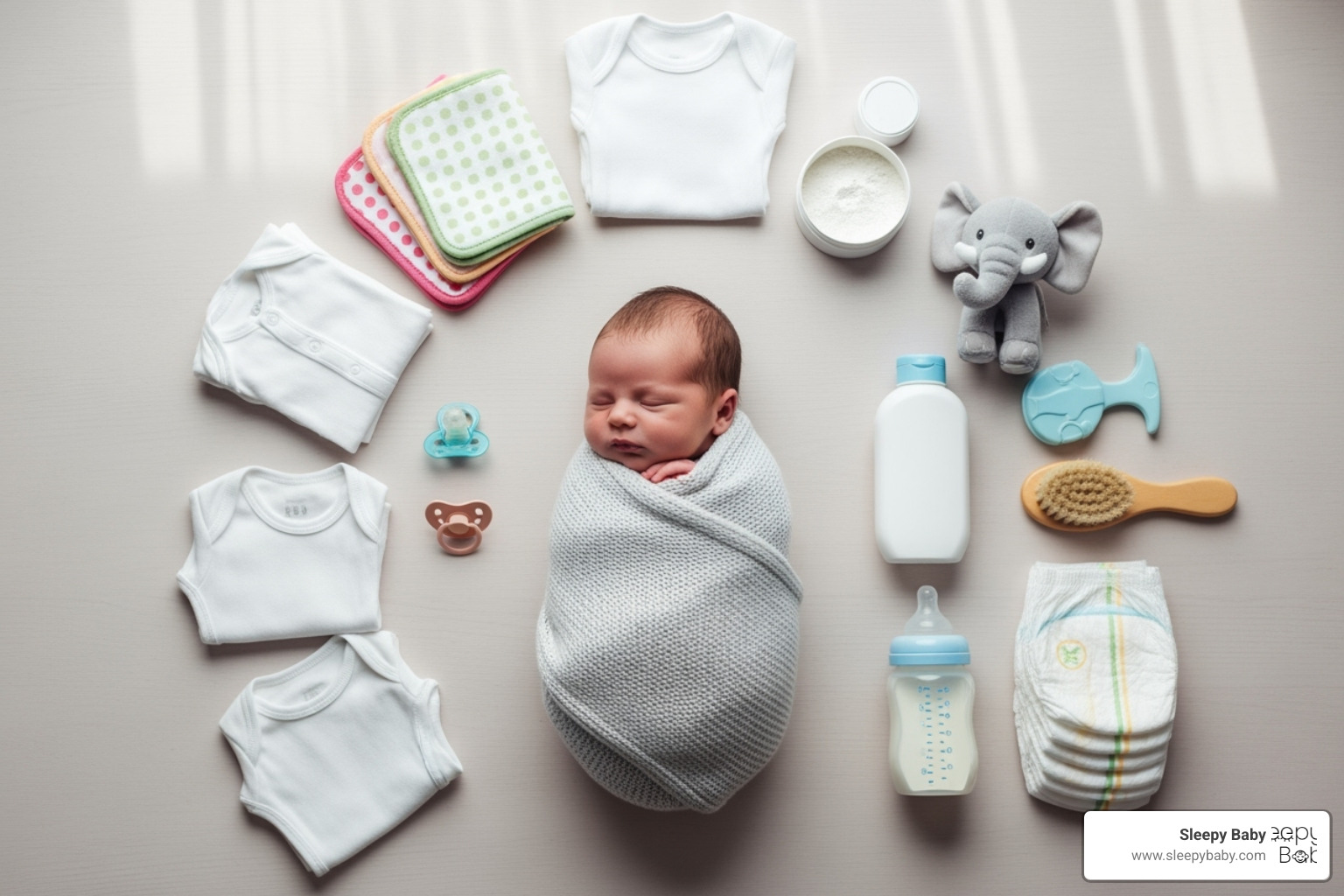
In the first three months, look for key milestones like cooing, gaining head control, and making eye contact. You can support their growth with simple activities:
-
Tummy Time: Short, supervised sessions strengthen neck and back muscles.
-
Talking, Singing, and Reading: Your voice is soothing and builds a foundation for language.
-
High-Contrast Toys: Black and white patterns are great for a newborn's developing vision.
-
Responding to Cues: Reacting to your baby's cries helps them feel secure. Learn to spot signs of overstimulation, like turning their head away.
For a detailed look at milestones, the Infant development: Birth to 3 months from Mayo Clinic is an excellent resource. Always consult your pediatrician if you have concerns about your baby's development.
Babyproofing Your Home for Safety
Babyproofing creates a safe space for your curious explorer. Key steps include:
- Using outlet covers.
- Securing cabinets and drawers with latches, especially in the kitchen and bathroom.
- Installing hardware-mounted safety gates at the top and bottom of stairs.
- Using furniture anchors to secure tall furniture and TVs.
- Using toilet seat locks to prevent drowning accidents.
Understanding your baby's cries is also a key part of safety. Learn more in Why Your Baby Won't Stop Crying.
Don't Forget About You: Postpartum Self-Care
Your well-being is just as important as your baby's baby needs. You cannot pour from an empty cup.
-
Accept help: When friends or family offer, say yes!
-
Rest when the baby rests: Prioritize sleep whenever you can.
-
Stay hydrated and nourished: Eat healthy meals and drink plenty of water.
-
Build support systems: Connect with other new parents or a mental health professional. It's okay to ask for help with postpartum depression.
-
Go easy on yourself: Each child and postpartum experience is unique. Avoid comparing your journey.
Frequently Asked Questions about Baby Needs
What are the best sleep aids for a newborn?
Safe sleep practices are paramount. Beyond swaddles, some parents look for additional tools to help their baby sleep.
While some white noise machines can be unsafe, modern safety-rated devices present white noise at safe, low-decibel levels, sometimes on the baby's chest to mimic womb sounds. Rhythmic tapping devices are also beneficial, as they replicate a caregiver's soothing pat. This hands-free soothing helps babies learn to self-soothe and promotes independent sleep.
At Sleepy Baby, we focus on mimicking a caregiver's comforting touch to support both babies and their tired caregivers. To learn how this technology works, read The Gentle Dreamer: The Baby Patting Device That's Revolutionizing Sleep for Babies and Families.
How many clothes does a newborn really need?
When it comes to baby needs for clothing, focus on practicality. You'll typically need 5-7 one-piece sleepers and 4-8 bodysuits or onesies. The exact number depends on how often you do laundry.
Round out the essentials with a few pairs of pants, socks, and season-appropriate hats. Babies grow fast, so avoid buying too many newborn-sized items, as some babies skip the size entirely.
What are the top 3 items I should put on my baby registry?
For big-ticket baby needs that are perfect for group gifting, prioritize these three items:
-
A safe infant car seat: This is a non-negotiable safety item you'll need to leave the hospital.
-
A crib or bassinet with a firm mattress: A safe, comfortable sleep space is fundamental.
-
A stroller: This will be invaluable for everything from doctor visits to neighborhood walks.
These items are essential for your baby's safety and comfort and are typically the most expensive, making them ideal for a registry.
Conclusion: You've Got This!
Preparing for a new baby can feel overwhelming, but you don't need to buy everything. By focusing on the true baby needs for sleeping, eating, and diapering, you can feel confident and prepared.
The real essentials come down to safety and practicality: a safe sleep space, proper nutrition, clean diapers, and basic clothing. Most importantly, your baby needs your love and attention.
Remember to care for your own well-being, too. A rested parent is better equipped to handle the challenges of a newborn, especially when it comes to sleep. When traditional soothing methods aren't enough, modern sleep aids can offer gentle support. At Sleepy Baby, our products are designed to mimic a caregiver's comforting touch, promoting better sleep for your baby and giving you a much-needed break.
Parenting is a journey of love and learning. Trust your instincts, ask for help, and know that you are the most important thing your baby needs. You've got this!
For more guidance on sleep solutions, explore our Newborn Sleep Solutions: A Product Roundup.





















